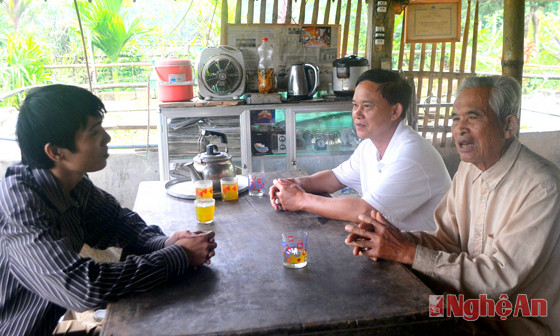"The big tree" in Coi village
(Baonghean) - For the Thai ethnic people in Coi village, Chau Dinh commune, Quy Hop district, village elder Hun Vi Can is truly the "big tree" of the village. Despite his rare old age, he still tirelessly devotes himself to the village's affairs, building Coi village into a cultural highlight of Chau Dinh commune and Quy Hop district.
 |
| Village elder Hun Vi Can (far right) talks with Coi village officials. |
Welcoming me into the house nestled in a lush garden with fruit trees and fish ponds, old Can modestly said: “I have devoted my whole life to the Party and the people, so I only do useful things when I see something, nothing grand.” However, the certificates of merit hanging prominently in the living room are proof of his tireless contributions. Taking a sip of tea, he said: “I was born in 1936 in this Coi village. In the past, my family was very poor, but my father and some relatives still contributed rice to invite a teacher to live in the house to teach, so I learned the national language.
Therefore, at the age of 16, I taught popular education and was sent by the State to study pedagogy, then continued to work as a youth volunteer to "eliminate illiteracy" in the old Quy Chau district". In 1963, when Quy Hop district was established, the young party member transferred to work at a number of agencies of the Quy Hop District Party Committee, and then at one point received a job at the Nghe An Art Troupe in the early 70s of the last century. Later, due to difficult family circumstances, he asked to transfer back to work in Quy Hop district until his retirement in 1984. However, promoting the pioneering and exemplary character of a cadre and party member, the old man continued to hold the position of Chairman of the Cooperative of Chau Dinh commune, then worked as Party cell secretary and head of Coi village until 2010.
With the belief that “as long as we have strength, we can work and contribute”, the old man focuses on developing the family economy. On 6 hectares of production land, the old man planted 4 hectares of acacia, dug ponds to raise fish; built tanks to raise catfish and loach; raised cows and goats. Income from the farm economy not only helps the family have a more stable and prosperous life, but most importantly, “so that people can see the family model and learn from it, follow it, and contribute to poverty reduction”, old man Can confided. Not stopping there, the old man also mobilized the village to support his efforts and contribute more materials to demolish temporary houses for poor households in the village. In particular, facing the reality of people's lives that still retain many backward customs, the old man mobilized people not to organize long-term funerals and weddings, and not to ask for heavy dowry.
With perseverance and persistence, the people of Coi village finally became enlightened and gradually eliminated those cumbersome, costly and wasteful customs. Although he was a man, every time there was a meeting of the women's association, "Mr. Can" - as the villagers affectionately called him - would attend, "speaking up" to clearly analyze the benefits of not having a third child. With his prestige, along with his close and sincere communication style, the women in the village gradually absorbed it, so for many years in Coi village, no one had a third child. The old man and the village executive committee established inter-family groups in the village and inter-village, proposed clear activities and received the consensus of the people to coordinate to ensure security and order in the area, connecting cultural and sports activities to build solidarity in the neighborhood.
However, the village story is not just that simple, the old man also thinks further than that, creating a future for his children, which is education. In village meetings, he always encourages families to encourage their children to go to school. For families whose children show signs of dropping out of school, he always thoroughly investigates the cause to have a specific way to encourage them. Therefore, although Coi village still has difficulties, more and more children are passing the entrance exams to universities across the country.
With his tireless efforts, the 55-year-old party member Hun Vi Can was honored to receive many certificates of merit from all levels, being a typical example in implementing Directive 03 of the Politburo on "continuing to promote studying and following the moral example of Ho Chi Minh" in Quy Hop district, as well as the gratitude and admiration of the people.
Thanh Duy






